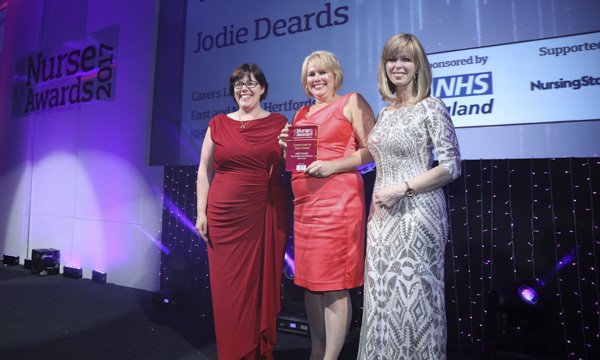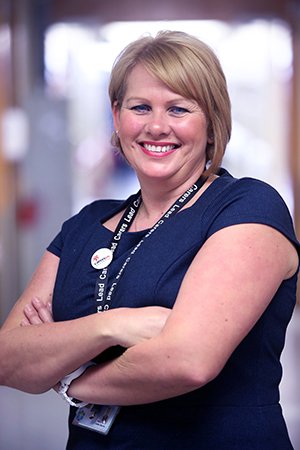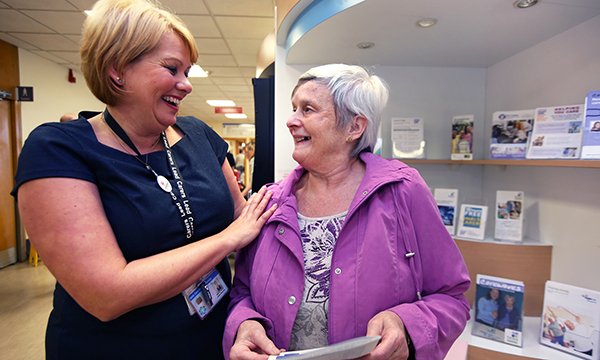Commitment to Carers award winner: ‘Small changes have a huge impact’

After implementing strategies to help carers visiting patients in hospital, Jodie Deards has been named the Commitment to Carers award winner at the RCNi Nurse Awards 2017
‘In the past when my dad was in hospital, I had been made to feel like an intruder without a valid opinion,' says Geraldine Strohm. ‘I was amazed to hear that I could get help with the extortionate parking costs. That small gesture meant so much to me, as all thoughts of personal care went out of the window while I was trying to help keep dad alive.’
Attitude of inclusion
Ms Strohm’s dad Geoffrey, who has dementia, had been rushed to Lister Hospital with pneumonia and septicaemia; he was dangerously ill. ‘As his primary carer, I was used to managing every aspect of his care, but now I felt helpless and superfluous,’ she says.
Worringly, he was transferred to a ward where Ms Strohm and her mother had previously had a poor experience. ‘I was dreading a repeat of that,’ she says. ‘However, from the moment I approached the ward, I could see dramatic improvements had been made.
‘I was treated as an important piece of the care jigsaw. What a positive experience Jodie Deards and her team created for me during a horrific experience.
‘Aside from the general attitude of inclusion that met me on a daily basis, there were no restrictions on visiting times and I was invited to stay over for several nights, which I did, spending hours trying to make my dad keep on his oxygen mask. This was a simple but crucial difference.’

Picture: Tim George
Culture change
East and North Hertfordshire Trust carers lead Jodie had previously identified that the Stevenage hospital needed to do better at identifying and supporting carers. In response she implemented a culture change that transformed the experience of carers and patients.
For her raft of practical measures and her determination to see the changes through, Jodie was named winner of the NHS England-sponsored Commitment to Carers category of the RCNi Nurse Awards 2017, the profession’s top accolade.
Visiting hours
Identifying people who have a caring role is traditionally difficult. According to the 2011 Census, there are 120,000 people in Hertfordshire who identify themselves as carers, but only 20,000 are registered.
Jodie says: ‘A hospital visit is the most likely time a carer will come into contact with a health professional, making it an ideal opportunity to identify and support carers so they can continue in their caring role. So we decided to lengthen our visiting times.’
In a four-week pilot, medical ward visiting hours increased from three hours a day to 9am-9pm each day. Identified carers had open access to wards 24 hours a day.
‘I did a lot of listening. It was important to understand the concerns of the ward staff and acknowledge these fears, but also to offer reassurance.’
Initially staff opposed the initiative. ‘We did a survey and staff thought it was a terrible idea and disruptive,’ says Jodie.
‘The key to overcoming this was to have a clear and simple message and a set timetable and repeat this often – that these changes are best for the patient, carers and the hospital, and to really believe in this.
‘It was important to identify supporters and speak to them often as they were crucial to spreading the message. I did a lot of listening. It was important to understand the concerns of the ward staff and acknowledge these fears, but also to offer reassurance.’
Support for staff
In response to those concerns she produced a patient information leaflet explaining visiting hours, which was translated to Bengali after requests by staff.
‘We developed a common questions leaflet for staff to support its implementation,’ says Jodie. ‘We also developed an intranet page, so information was easily available.
‘Continual staff and carer feedback during the pilot allowed improvement in support packs for the staff. The increase in information and signage has also encouraged carers to identify themselves to staff.’

Once identified, carers are asked whether they want to continuein that role during the admission process so they can work in partnership with nurses.
They have access to a support options including overnight guest beds and showering facilities and hot and cold drinks on the wards. Jodie is particularly proud of the ‘snack bags’ she has introduced for carers’ evening meals.
‘Eating together and sharing a meal is often taken for granted, but it’s part of everyone’s social life and we are allowing this to continue in hospital'
‘To see patients and the person who cares for them share a meal is so lovely,’ she says. ‘It has a small cost but such a huge impact, more than I ever imagined when I first thought of the idea.
‘Eating together and sharing a meal is often taken for granted, but it’s part of everyone’s social life and we are allowing this to continue in hospital. And we are providing nutrition for the carer, looking after them, and in the long term, stopping them from being our next patient.
‘The carer feels looked after, the patient eats more so health is improved, staff understand the relationship between the patient and the carer better, which results in better outcomes. It’s a win at every level.’
Carer’s passport
Carers are also entitled to discounts in the hospital restaurant and shops and reduced car parking charges.
Using a Carer’s Passport, nurses ensure they receive a needs assessment, have contingency plans and are registered at their GP surgery. A volunteer carer support group has been created.
‘Registration of carers was a challenge,’ says Jodie. ‘So I produced an instruction leaflet and have set up a league table for each ward with an incentive each month for the most referrals.’
She spread the word through meetings, ward visits, presentations, bulletins and local carer voluntary groups. ‘We used social media to tell the pubic we are more carer friendly,’ says Jodie. ‘And I spent a lot of time on the wards to show staff what we were trying to do.
‘The project has identified 113 carers previously not known to community services and signposted them for carer assessments and support groups.’
Better communication
Despite their initial opposition, the longer visiting hours have helped staff to better understand the role of carers. ‘Staff are more confident working in partnership with them,’ says Jodie. ‘They understand that identifying a carer improves communication about the patient's needs, allows for sharing of information, the development of a partnership in care and a more robust discharge.’
Feedback from carers has also been positive. ‘They feel valued and have more confidence in the staff, which decreases their levels of anxiety,’ says Jodie. ‘Referral to outside organisations early in the admission allows carers to be given support before discharge, which means they are less likely to experience a crisis.’
The pilot was such a success that the project was extended to all medical and surgical wards. The trust’s director of nursing Liz Lees says: ‘Jodie’s initiatives have put in the interests of our carers, and those who they look after, at the heart of what we do.
‘She has also worked hard to bring her ward colleagues with her and all this hard work is really paying off. Thanks to Jodie, our hospitals are now much more carer friendly.’
‘Exceptional leadership’
NHS England experience of care lead for community, primary and integrated care Jen Kenward said: ‘With the number of unpaid carers in England growing faster than the rate of our population, Jodie has demonstrated exceptional leadership in developing her programme.
'She not only understands the added pressure carers experience when a loved one is in hospital, but critically recognises them as expert partners in care. Jodie demonstrated her knowledge of the need to facilitate support for carers to manage their own well-being, and she has achieved this by taking an integrated approach to this work, delivering this carers support programme in partnership with local voluntary sector and community services.
‘She is driving cultural change within her trust and improving integrated working with key community partners.’

RCNi Nurse Awards judge Margaret Sneddon, honorary senior research fellow at the University of Glasgow, agrees. ‘Jodie has changed attitudes, practice and indeed the whole culture through the implementation of the Carer’s Passport, a whole package of support. This has been achieved through effective engagement of staff.
‘The early stages of evaluation show a positive impact with potential to reduce risks and hospital stays, and demonstrate staff commitment as well as a justifiable pride in what they have achieved.’
‘The important thing is to ensure the guiding principles are being delivered and to empower the staff to implement them at the ward level’
Jodie is currently working with the trust’s other inpatient hospital to implement the same support package there. Her recent Carer Best Practice workshop, attended by carer charity and hospital and community services representatives, identified ways to develop carer support further.
She also held a ‘Caring Counts’ day, at which 20 new carers were identified. ‘We gave visitors who had a caring role a sunflower on which to write what caring means to them and we have displayed the sunflowers along the main corridor,’ she says.
Further support
‘Our next step is to develop a carer pathway with the community trust to ensure carers are supported as the person they care for moves between services.’
She plans to involve the Carer Focus Group in developing a booklet called ‘This is Me, I am a Carer’ to give the carer a voice. The project is due to be piloted towards the end of the year.
Three other trusts are considering implementing the snack bag.
Jodie’s advice to nurses thinking about replicating the service is simply ‘do it’.
‘The important thing is to ensure the guiding principles are being delivered and to empower the staff to implement them at the ward level,’ she says.
‘These small changes have had such a huge impact. The wards are less frantic and there are fewer phone enquiries. The ward atmosphere is more inviting and caring. You can really see and feel the differences this makes to the patients and the carers. When someone says to me “I could visit at any time and help with mum”, it is rewarding – and what the whole project is about.’

The RCNi Commitment to Carers Award is sponsored by NHS England

